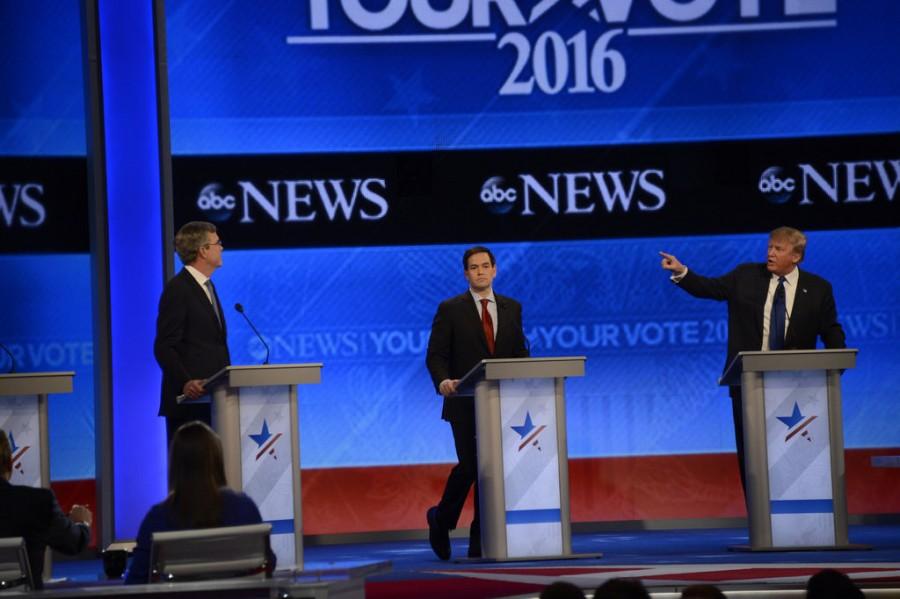Students’ presidential candidate choice
While eligible voters with different political views go to the polling stations to vote, many students who cannot vote in our school are also opinionated. On campus, we have a huge variety of political views.
Gabe Moore, for example, is a staunch Bernie Sanders supporter. One of the most important reasons why Moore supports Sanders revolves around the 2010 FEC v. Citizens United Supreme Court decision.
“We need money out of politics, and it’s a big deal, and he is the only candidate that stands for it,” Moore said, citing Hillary Clinton’s ties to Wall Street.
He is also very confident about Sander’s electability in the general election.
“[Ohio Governor John] Kasich is the strongest the Republicans can throw at him. Thankfully, they weren’t sane enough to elect him,” Moore said.
Governor Kasich cannot win the nomination on the first ballot, where most of the GOP delegates are bound to vote by their state contest winners. There simply are not enough delegates left that Kasich can win to reach 1237 delegates required for the GOP nomination, on the first ballot.
Trump needs to win 60% of the remaining delegates while Cruz needs 90%. While they don’t appear to be good odds for the two probable candidates, GOP state contests are usually winner-takes-all or winner-takes-most, like Wisconsin.
“Kasich probably has an outside chance in a contested convention; [contested conventions happened] so long ago that no one knows how it is going to play out,” AP Government teacher Mr. Tim Farnan said.
“The Republican Party will have to be very worried about fracturing themselves for the future. How many of those people would just leave the Republican Party based on Trump being manipulated at the convention,” Farnan said.
This viewpoint resonates with Storm McTague, a supporter of Donald Trump.
“If [the Republican National Convention] do kick him out, I think it would be devastating to themselves, because to have a person the people nominated, only to rip him away would just destroy the Republican Party, […] I do believe he would run independent [if that happens], but the […] Democrats would win because the Republicans would have to put someone else forward, and it would split the conservative vote,” McTague said.
With that being said, McTague is confident that Trump will pull it off and secure the nomination. In this scenario, Cruz supporter Jacob Halley doesn’t know who to support in the general election.
“I would like to see a one-on-one debate with the Democratic frontrunner before I make an opinion about it,” Halley said.
Originally a supporter of Carly Fiorina, who had notable debate performance in the first two GOP debates but eventually dropped out in February, Halley switched his support towards Ted Cruz.
“[Ted Cruz] has proven time and time again how he will support his own views no matter what the entirety of the nation doesn’t like,” Halley said.
He highly distrusts Donald Trump, especially with the issue whether or not Trump is a real conservative.
“I don’t like how [Donald Trump] is wishy-washy, like he was a liberal democrat back in the 80s and 90s, and all the sudden he is the frontrunner of the Republican Party, I don’t think he is a real conservative,” Halley said.
Moore, McTague and Halley all have a common general dislike for Hillary Clinton, the current Democratic frontrunner.
“There are a lot of moderates who can’t stand Hillary,” Farnan said. Before the interviews were conducted, Farnan said he wouldn’t state his political opinions.
That being said, Farnan points out the fact that the investigation of the Clinton emails are still ongoing.
“Where there’s smoke, there’s probably a little bit of fire. I don’t know how big the fire is, but the fact that an administration led by a Democratic president is continuing to investigate a Democratic nominee, potentially, is interesting,” Farnan said.
Upcoming primaries include the April 19 primary in New York, awards a lot of delegates on both sides, accompanied by a Democratic debate on April 14, sponsored by CNN and local news network NY1. Currently, Hillary Clinton leads Bernie Sanders by 17 points in New York according to the most recent NBC poll.
Contrary to popular belief, Farnan doesn’t think the April 14 debate is going to have an effect on the results of the New York primary.
“I think at this point most people have already decided, and if you still haven’t decided between Hillary and Bernie, you probably aren’t going to be the person who shows up to a primary to vote, you may vote in the general election, but people that vote in the primaries are people that feel very strongly about one candidate or another,” Farnan said.
California’s primary is on June 7 and voter registration deadline is May 23.
by JUSTIN KWOK








